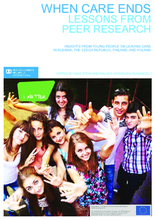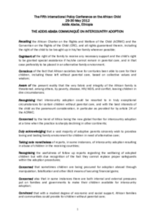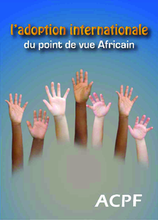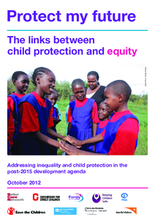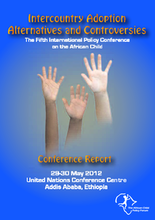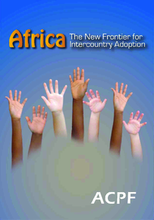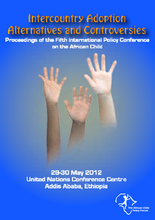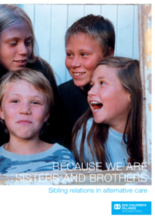Displaying 1331 - 1340 of 1798
This report presents the findings from a two-year peer research project which includes the testimony of more than 300 young people with care experience in Albania, the Czech Republic, Finland, and Poland. More than 40 care leavers from the four countries were selected and trained to play an active role in the all aspects of the projects. The interviews revealed widespread inadequacies regarding the process of leaving care, promoting the research team to draw up recommendations to address them.
In the recently released outcome document of the Fifth International Policy Conference on the African Child, conference delegates call for a reversal of the current trend of resorting to intercountry adoption as a primary solution for African children in need of alternative care, and for giving prime priority to enabling all children in Africa to remain with their families and communities.
This publication, published in French, was prepared as a background document to inform the discussions and debates during the Fifth International Policy Conference on the African Child held on 29-30 May 2012 in Addis Ababa, Ethiopia. This report examines the rationale behind increasing intercountry adoption in Africa, the main thrust of international standards, the extent and magnitude of African intercountry adoption and its problems and challenges. The paper provides recommendations to this increasing trend and aims to establish a more Pan-African position on the topic of intercountry adoption.
The lack of care and protection facing children is a global crisis. This paper is part of an inter-agency series originally developed to feed into the global thematic consultation for the post MDG framework: ‘Addressing Inequalities. The Heart of the Post-2015 Development Agenda and the Future We Want for All.’ It looks at the relationship between this lack of care and protection and inequality. It explores how inadequate care and protection produces and contributes to inequalities and how inequality is itself a cause of inadequate care and protection. The paper also examines the long-lasting impact of inadequate care and protection which greatly affects children’s life chances into adulthood, suggesting that inadequate care and protection is in itself a form of inequity.
This document provides an overview of The Fifth International Policy Conference on the African Child held on 29-30 May 2012 at the United Nations Conference Center Addis Ababa, Ethiopia. The overall goal of the Fifth IPC was to further the discussion on intercountry adoption and to contribute to the improvement of national laws, policies, systems and procedures relating to intercountry adoption.
This publication was prepared as a background document to inform the discussions and debates during the Fifth International Policy Conference on the African Child held on 29-30 May 2012 in Addis Ababa, Ethiopia. This report provides a situational analysis of the law and practice of intercountry adoption in Africa, with the aim of informing debate on conceptualizing, developing and implementing policies, laws, and programs and research in relation to intercountry adoption in Africa.
The Proceedings report presents summaries of all presentations delivered and of all plenary discussions held during each session of the Fifth International Policy Conference on the African Child (IPC) held on 29 and 30 May 2012 in Addis Ababa, Ethiopia, which brought together experts, policymakers, and key stakeholders to discuss various issues and the implications of intercountry adoption in Africa.
This publication by SOS Children’s Villages International brings together research findings, learning and policy recommendations about sibling relations in alternative care gathered from five different SOS Children’s Villages associations (Germany, Austria, France, Italy, and Spain).
This document from the National Statistical Service of the Republic of Armenia provides an overview and assessment of the alternative care system in the country.
This Declaration on Child Rights and Wellbeing was adopted by the Partner States of the East African Community (EAC) in Bujumbura on 3rd September 2012 during the First EAC Child Rights Conference under the theme, “Addressing the issues that negatively impact on the realisation of child rights in the EAC.”

